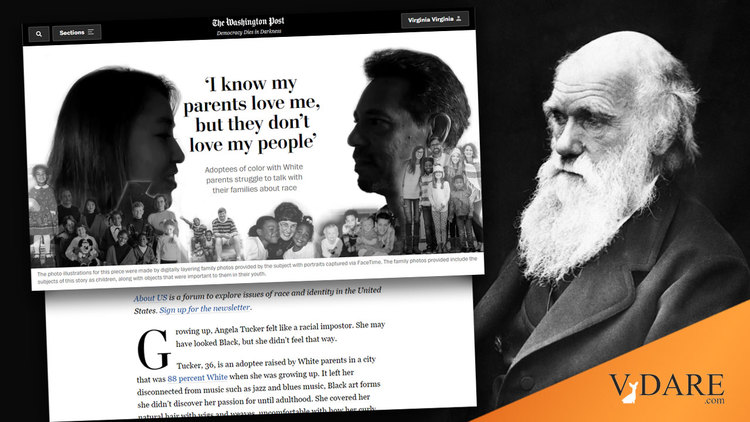
The Darwinian Roots of World War Hair
12/15/2021
From the Washington Post news section:
‘I know my parents love me, but they don’t love my people’
Adoptees of color with White parents struggle to talk with their families about race
Story by Rachel Hatzipanagos
Dec. 13, 2021
Growing up, Angela Tucker felt like a racial impostor. She may have looked Black, but she didn’t feel that way.
Tucker, 36, is an adoptee raised by White parents in a city that was 88 percent White when she was growing up. It left her disconnected from music such as jazz and blues music, Black art forms she didn’t discover her passion for until adulthood.
Whereas all other black children born in the 1980s grew up to love jazz and blues.
Okay, this is a long article, so I’ll just focus on one topic in it, but it’s the Big One:
She covered her natural hair with wigs and weaves, uncomfortable with how her curly strands appeared in predominantly White environments.
… Classmates’ racist comments about their hair and eyes were dismissed as harmless curiosity. America’s racial dynamics were explained in the language of “colorblind” idealism.
… But she was also disheartened by her impulse to casually dismiss racism when it came her way, like when students in her mostly White school put pencils in her hair and marveled at the way the texture made them stay in place, she said. …
Wik, 27, remembers a first-grade classmate asking her, “What’s wrong with your eyes?” as he pulled his eyelids back. Others would ask her whether her hair was her “real hair.”
… Growing up, Black transracial adoptee Rebeccah Carlson hated the color of her skin. She hated her hair and her lips.
This reminds me of Darwin’s big follow-up to the Origin of Species, The Descent of Man, and Selection in Relation to Sex, in which he attributed some of the distinctiveness of races to sexual selection for traits that are appealing to the opposite sex rather than directly functional in the struggle for life (the peacock’s tail being the most famous example).
It’s striking how much of the racial animus in the American media these days appears to derive from black women being less sexually selected for hair length than other races of women. But, Darwin might not have been surprised.
